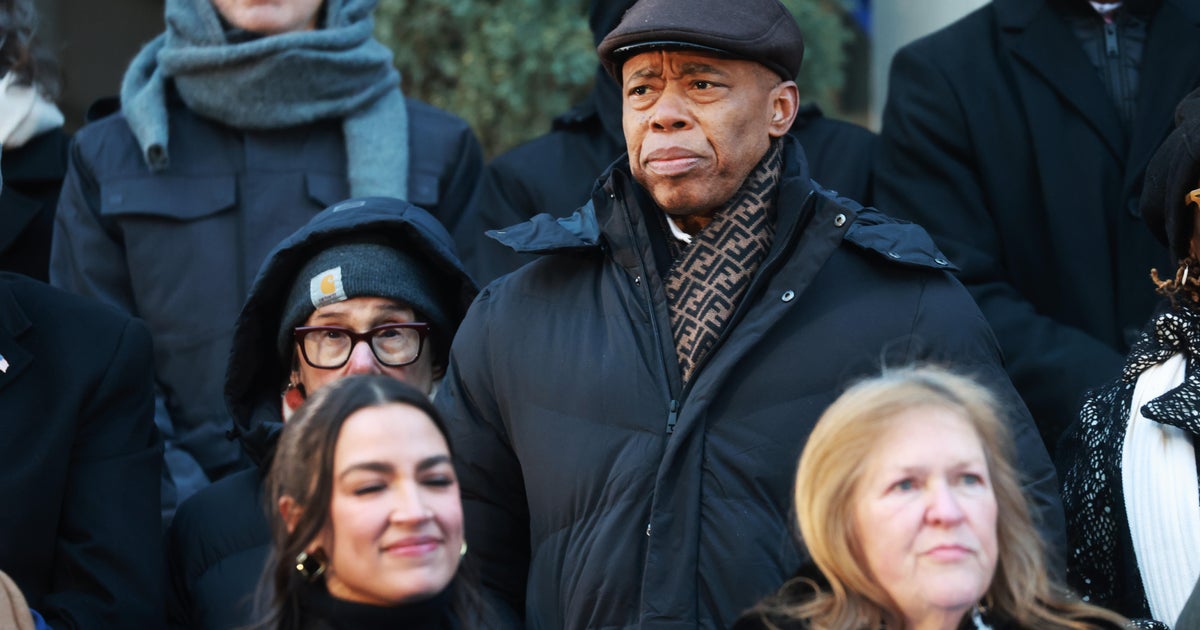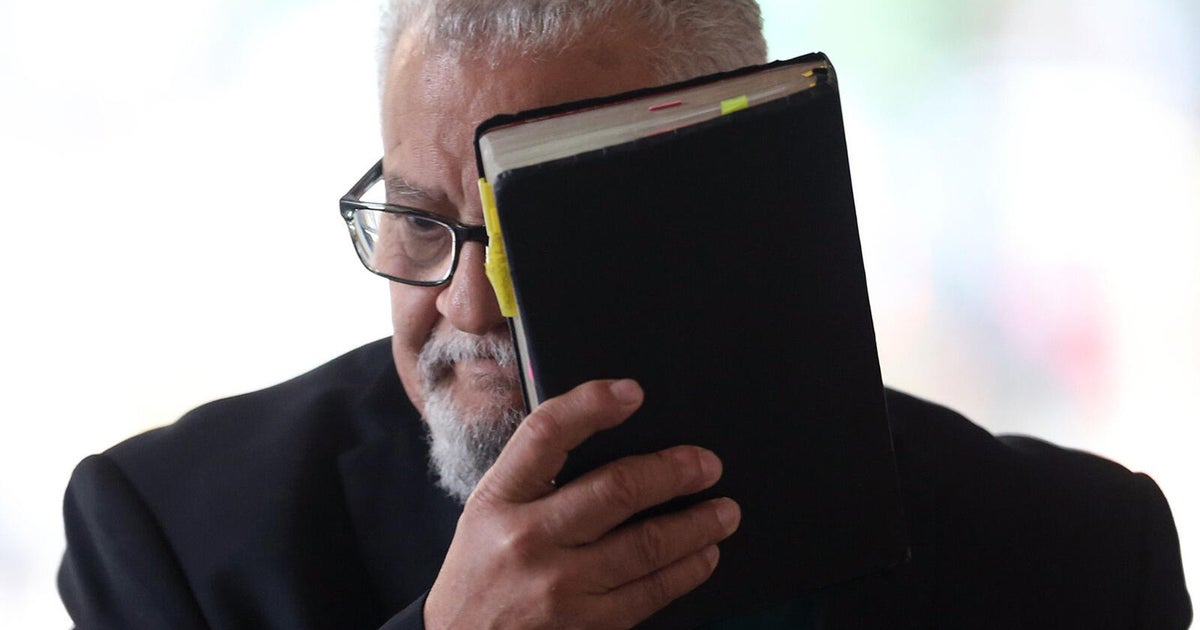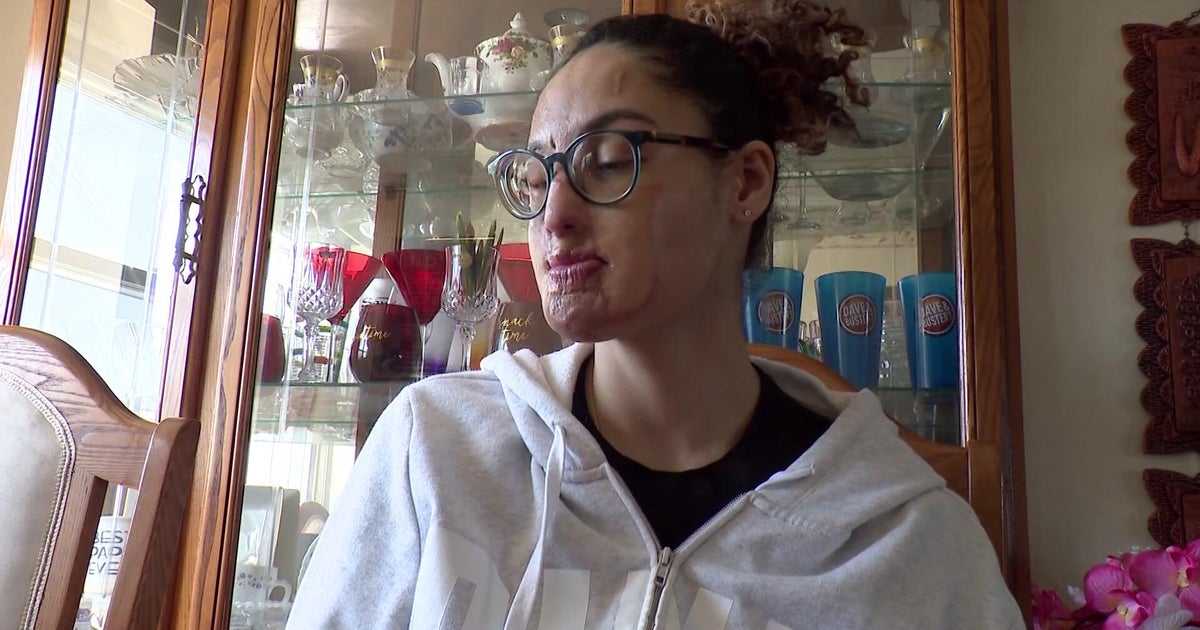Blagojevich Completes Testimony At Retrial
UPDATED 06/07/11 6:15 p.m.
CHICAGO (CBS) -- Rod Blagojevich completed his testimony at his corruption retrial on Tuesday and the judge said he expects the jury could begin deliberating by the end of the week.
Prosecutors ended their cross-examination of Blagojevich on Tuesday, grilling the former governor about allegations that he was trying to trade an appointment to President Barack Obama's former Senate seat for campaign cash. CBS 2's Dana Kozlov reports.
As he left the stand Tuesday afternoon, Blagojevich offered to shake hands with the prosecutors, in full view of the jury, but was snubbed. U.S. District Judge James Zagel said the jury shouldn't read anything into the prosecution's refusal to shake hands with Blagojevich, explaining that lawyers can't have such personal contact with witnesses once they're off the stand.
Zagel said the defense plans to call two more witnesses on Wednesday for brief testimony and then prosecutors will present a rebuttal case.
Prosecutors could begin their closing argument Wednesday afternoon, followed by the defense's closing and the prosecution's rebuttal argument on Thursday. If that's the case, Zagel said the jury would begin its deliberations on Friday, to avoid having them go home for a long weekend after they get the case.
Blagojevich was on the stand for a seventh day on Tuesday as lead prosecutor Reid Schar grilled him about an offer from Indian-American fundraiser Raghu Nayak to raise $1.5 million in campaign cash for Blagojevich in exchange for picking Congressman Jesse Jackson Jr. to the seat.
Prosecutors have contended that Blagojevich's final scheme for the Senate seat was to trade a Jackson appointment for the $1.5 million in campaign cash, but Blagojevich has insisted he rejected the offer and never seriously considered Jackson for the seat.
Blagojevich said the offer initially came through an intermediary, Rajinder Bedi, as "accelerated fundraising" but that Nayak later provided specific amounts of campaign cash.
On Tuesday, Schar repeatedly asked Blagojevich whether he considered the offer of campaign cash to be a bribe, but Blagojevich refused to give a yes or no answer.
"In fact, what they were offering you was bribes?" Schar asked.
"They were offering me campaign funds in exchange for the Senate seat," Blagojevich said. "It's illegal."
"If it's not a bribe, what would you call it?" Schar asked.
"A violation of the campaign fundraising laws," Blagojevich testified.
"You didn't view it as a bribe?" Schar added.
"I viewed it as illegal," Blagojevich answered. "I never stopped and thought about it as a bribe or not a bribe."
Blagojevich has insisted that he never seriously considered appointing Jackson to the Senate seat and that he only ever discussed him as an option to use as leverage to broker a legitimate political deal to appoint Illinois Attorney General Lisa Madigan to the seat in order to get her father, Illinois House Speaker Mike Madigan, to support his agenda in Springfield.
But Schar pointed to several calls that seemed to indicate that Blagojevich was honestly considering Jackson for the seat.
In one call with his chief of staff, John Harris, Blagojevich said he was beginning to honestly consider appointing Jackson to the Senate.
"I'm honestly gonna objectively look at the value of puttin' Jesse Jr. there. As ridiculous as it is and as painful and offensive as it is," Blagojevich said. "I'm gonna begin for the first time to objectively honestly consider him."
In the same call, Blagojevich informed Harris of the offer of campaign cash from Nayak.
"Well, he's [Jackson has] come to me with, through third parties, you know with offers of campaign contributions and help," Blagojevich said. "You know what I mean? 1.5 million. They've, they're throwin' numbers around."
Schar asked if Blagojevich was referring to Nayak's illegal offer of campaign cash at that point. Blagojevich said yes, but pointed out that later in the phone call that Harris said the campaign cash would not be a factor in picking Jackson and he agreed.
"I say yeah, not a factor," Blagojevich said.
"My question was, that was a reference to the illegal fundraising" Schar asked. Blagojevich said yes.
Schar also pointed to another phone call Blagojevich had with his pollster, Fred Yang, in which Blagojevich said, "There's tangible, concrete tangible stuff from supporters. … Well like, you know. You know what I'm talking about. … Political, tangible political support. … You know. Specific amounts and everything."
Blagojevich conceded that, when he said "specific amounts," he was telling Yang about the offer of campaign cash from Nayak. But he insisted that when he said "tangible, concrete stuff," he was talking about his demand that Jackson publicly support his political priorities in Springfield before Jackson could get the Senate seat.
Schar also focused on Blagojevich's admission that he asked his brother to meet with Nayak in December about a possible Jackson pick, even though he knew Nayak had made an illegal offer of campaign cash.
"You wanted him to reach out to Nayak?" Schar asked. Blagojevich said "Yes.
"The same Raghu Nayak who had offered illegal campaign fundraising" in exchange for a Jackson pick, Schar added. Blagojevich said "yes."
Judge Won't Let Defense Play Tape Of Emanuel Request
The name of Chicago's new mayor, Rahm Emanuel, also came up again in court on Tuesday. Defense attorneys wanted to play a tape from a 2008 phone call of Blagojevich speaking to Emanuel, who had just been picked as incoming President Obama's chief of staff.
They talked about a request from Emanuel, then a congressman, to have Blagojevich appoint a temporary successor to the U.S. House seat he was vacating. Prosecutors had mentioned the tape earlier, pointing out that – even though Blagojevich didn't have the Constitutional authority to appoint a person to the House of Representatives – he told an adviser "That's a favor worth doing."
Defense attorneys wanted to play the tape of the phone call to show that Blagojevich told Emanuel he would make the appointment if it were legal.
But Zagel wouldn't allow them to play the tape, saying that the prosecution was not arguing that Blagojevich told Emanuel he was willing to violate the Constitution to make an appointment, but that he told an adviser he was willing to do so.
Had the judge allowed the tape to be played, it would have been the first time jurors would have heard Emanuel on an FBI wiretap – although Emanuel did briefly testify last week about unrelated issues.
According to a transcript of the phone call submitted by the defense, Emanuel wanted Blagojevich to appoint Forrest Claypool to his vacant Congressional seat until a special election could be held, because it would give Claypool a leg up on his rivals for the seat.
Emanuel also said that Claypool only wanted to serve one or two terms in Congress and "then he wants to go to the Cabinet."
But Blagojevich explained that his advisers had already told him that the seat could only be filled by a special election.
Defense Re-Emphasizes No Quid Pro Quo
Defense attorneys asked a number of follow-up questions after prosecutors completed their cross-examination, trying to reassert that Blagojevich never tried to exchange the Senate seat for personal benefits.
Under questioning from defense attorney Aaron Goldstein, Blagojevich explained that the reason he talked to his aides about the offer of campaign cash from Nayak – even though he claimed he wasn't interested in the offer – was that he just wanted to relay the message to his advisers.
"I was conveying … what purportedly was an offer from Congressman Jackson" through his political supporters, Blagojevich said.
"You were just relaying what was related to you?" defense attorney Aaron Goldstein asked.
Blagojevich said "yes."
The defense also reiterated their contention that Blagojevich never offered to trade or sell the Senate seat for campaign cash or for a job for himself with the Obama administration.
For example, Goldstein pointed out that, in a meeting with labor union boss Tom Balanoff on Nov. 6, 2008, Blagojevich brought up the possibility of being appointed Secretary of the U.S. Department of Health and Human Services.
"You threw out the idea of Health and Human Services, is that right?" Goldstein said. Blagojevich said yes.
"You didn't promise it explicitly or implicitly that this was in exchange for (Obama adviser) Valerie Jarrett" getting the Senate seat, Goldstein asked. Blagojevich said, "Absolutely not."
Blagojevich also sought to explain a phone call with his chief of staff, John Harris, and his pollster, Fred Yang, in which he discussed his interest in Health and Human Services.
"If I'd get that, and, and, and if, if that was somethin' available to me and maybe it's really unrealistic, but if that was available to me I could do Valerie Jarrett in a heartbeat," Blagojevich said in the call.
Goldstein asked Blagojevich if that message was what he told Balanoff in their meeting. Blagojevich said no.
"Did you say anything close to that to Tom Balanoff?" Goldstein asked. Blagojevich said no.
Blagojevich Accuses Prosecutor Of "Twisting My Words"
Schar also confronted Blagojevich with a phone call in which he discusses the alleged deal for a Jackson appointment with his brother, telling him to meet with Nayak. Blagojevich insisted the meeting was part of his effort to leverage a possible Jackson appointment to make a legitimate deal for Lisa Madigan.
But in the call, Blagojevich tells his brother to be "careful" about the meeting.
"If in fact there's, there's, this is, you know, this is possible, then some of the stuff's gotta start happening now," Blagojevich said in the call. "And we gotta see it. … You understand? Now you gotta be careful how you express that. And assume everybody's listening, the whole world's listening."
Schar contended that Blagojevich meant he didn't want his brother to get caught asking Nayak for campaign cash, but Blagojevich disagreed.
"Talk like the whole world's listening, which means do things right. … If you intend to follow the law, you talk like the whole world's listening," Blagojevich said. "I'm proud of those words. … With all due respect, Mr. Schar, you're twisting my words."
Jurors Hear Two Explanations For Feud With Jackson
Blagojevich has acknowledged that he did not trust Jackson because of a falling out between them while Blagojevich was running for governor in 2002. But the prosecution and the defense have offered two very different reasons for the feud.
Prosecutors contend that Blagojevich wanted Jackson to donate $25,000 to his campaign fund in 2002, but Jackson refused.
"Isn't it true, sir, that he refused to do that and there was a consequence for that?" Schar asked Blagojevich.
"No, absolutely not," Blagojevich said.
Schar also pointed to Jackson's allegation earlier in the trial that he sought a job for his wife, Sandi, with the Blagojevich administration in 2003, but she was rejected and Blagojevich later hinted Jackson should have given him the contribution. Blagojevich has denied that allegation.
But Schar brought it up again Tuesday, asking Blagojevich if the reason for the feud with Jackson was because Blagojevich "Wouldn't give his [Jackson's] wife a job."
"That's absolutely false and not true," Blagojevich said.
Blagojevich has insisted that the reason for their feud was that Jackson promised to endorse him for governor in 2002, but ended up backing another candidate.
On Tuesday, Blagojevich again denied ever seeking campaign cash from Jackson, either in 2002 or 2008.
"I never asked Congressman Jackson to do a fundraiser for me," Blagojevich said. "Everybody knows he never raises money for anybody."
Prosecutor Grills Blago On Alleged Tollway Shakedown
Earlier Tuesday, Schar questioned Blagojevich about his alleged attempt to squeeze road building executive Gerry Krozel for fundraising help in exchange for a major tollway project that the construction industry wanted.
Prosecutors contend that Blagojevich approved a $1.8 billion tollway project and then dangled a separate $6 billion tollway project in front of Krozel in order to convince him to raise campaign cash from his fellow road builders.
But Blagojevich has insisted he never told Krozel that he was planning to go forward with the larger tollway project and that his desire for campaign cash from Krozel was not tied to any tollway projects.
Schar questioned Blagojevich about a September 2008 meeting with Krozel, at which they discussed possible tollway expansion projects, as well as fundraising.
Krozel has already testified that, at that meeting, Blagojevich told him he was approving the $1.8 billion tollway plan and expected to go forward with the $6 billion program at the beginning of 2009.
Krozel also said that Blagojevich wanted him to raise $500,000 in campaign cash before the end of the year, which he believed was a message that Blagojevich wouldn't approve the larger tollway plan unless Krozel satisfied his need for campaign cash.
But Blagojevich again insisted on Tuesday that he never told Krozel that he was expecting to go forward with the $6 billion program at the beginning of 2009, or that he ever tied that to fundraising.
But Schar tried to prove that Blagojevich did tie the two issues together by pointing to another meeting that Blagojevich had with Krozel and his two bosses at Prairie Cement – CEOs Eric Madsen and Richard Olsen – at a suburban restaurant.
"Isn't it a fact that at this meeting that you stated to Mr. Krozel and the two CEOs that you would do the $6 billion program … at the beginning of 2009?" But Blagojevich insisted that he only mentioned the larger tollway program as part of a much larger capital construction program that he wanted the legislature to approve for years.
"It had to have been in connection with the capital bill," Blagojevich testified.
But Schar continued to hammer away that Blagojevich mentioned the $6 billion tollway plan as a standalone project that the governor could approve on his own.
"Didn't you tell Mr. Krozel, Mr. Madsen and Mr. Olsen that you would do the $6 billion program after the beginning of 2009?" Schar asked. Blagojevich again insisted that he only mentioned it as part of the larger capital bill.
"I'm asking you separate and apart from the capital bill, isn't it a fact that you told Mr. Krozel, Mr. Madsen and Mr. Olsen that you would do the $6 billion program at the first of the year?" Schar asked, but Blagojevich again insisted it would only have been part of the larger capital program.
Schar tried one more time.
"Putting aside the capital program, didn't you tell them you would do the $6 billion program, regardless of whether you did the capital program or not, after the first of the year?" he asked.
"I don't believe I did," Blagojevich said.
Todd Feurer, CBS 2 Web Producer







